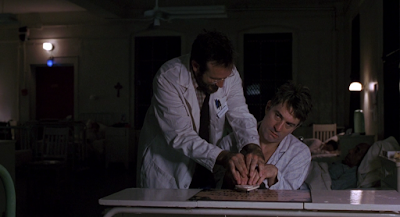One of the main theories of social psychology that can be brought up in this film is prejudice and discrimination. It could be seen how the members of the Nazi Party were filled with prejudice and ignorance as they treated the jews in a discriminatory manner. They single out the jews based on their religion and then began a mass genocide in an attempt to gain power over them. This is linked with obedience, as it could be clearly seen that the Nazi guards and officers were killing them based on authorities’ instructions. Eventually, this led to them killing without repercussions -- perhaps due to their social roles and the power they had manifested. For example, when any Jewish person did not perform to their satisfaction or just talked to them (i.e. the female engineer warning them about the building’s foundation), the Nazis would shoot them in the head immediately, without warning. They killed for unjust reasons and often without remorse. They appeared to kill on impulse as if they were desensitised from all the murder and killing.
Another theory that could be seen in action was the process of deindividuation towards the jews. They were treated like animals when sent to the concentration camps -- cramped up in the trains with little to no space between each other; they were forced to evacuate their own homes to move into the ghettos and had their belongings stolen; and their health check ups were done out in the open with the requirement to strip naked. These actions took away their right to choice and humiliated them. They were treated as if their lives did not matter and as if they mean nothing, rather than human beings. What is sad about this is that this wasn't even at the concentration camps yet, and they were already treated this way. This links to the cognitive dissonance that Oskar Schindler seemed to be experiencing in the film. He knew that the jews were getting atrocious treatment, yet he continued to profit off them for his benefit. However, when he witnessed the liquidation of the ghettos was when the discomfort could be seen on his face. He indirectly helped the jews by hiring them to his business to save them from going to concentration camps and so on. He knew it was dangerous to treat them nicely, even gaining the reputation of being a ‘jew-sympathizer’. Yet, he could not do anything to help them without fear of being a suspect to treating them kindly.
In terms of the cinematography, Steven Spielberg had it filled with beautiful stills and shots, albeit can be dark and disturbing as it explicitly shows the ugly side behind this event. The entire film was shot in black and white as if to signify the time period of when this event occurred; to show that it’s historical. This was contrasted with the last part of the film that showed the present day people who were on Schindler’s list. This showed how much has changed and symbolises the modern-day Schindler’s jews.




















